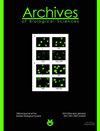全反式维甲酸通过上调正常人表皮角质形成细胞中的胰岛素样生长因子结合蛋白-6来防止氧化应激介导的细胞衰老
IF 0.8
4区 生物学
Q4 BIOLOGY
引用次数: 0
摘要
全反式维甲酸(ATRA)影响细胞增殖和分化,但其在角质形成细胞中的作用机制尚不清楚。为了研究ATRA在角质形成细胞中的潜在作用机制,对ATRA处理的正常人表皮角质形成细胞(NHEKs)进行了微阵列分析。基于微阵列数据,我们将重点放在胰岛素样生长因子结合蛋白6 (IGFBP-6)上,该蛋白已知可抑制细胞衰老,但此前尚未在atra诱导的NHEKs信号传导中进行研究。我们证实ATRA显著增加了NHEKs中IGFBP-6基因和蛋白的表达。接下来,研究了ATRA和IGFBP-6对h2o2处理的NHEKs细胞增殖和衰老的影响。IGFBP-6被siRNA敲低或被pCMV-IGFBP-6过表达。用溴脱氧尿苷(BrdU)掺入法观察细胞增殖。通过监测SA-?-Gal染色和p21表达。当IGFBP-6被敲低时,细胞增殖受到抑制,细胞衰老标志物增加。IGFBP-6过表达或ATRA处理h2o2处理的NHEKs恢复了这些作用。综上所述,我们的研究结果表明,ATRA至少在一定程度上通过增加IGFBP-6的表达来预防与过早衰老相关的皮肤损伤,正如本文在活性氧(ROS)刺激的NHEKs中所示。本文章由计算机程序翻译,如有差异,请以英文原文为准。
All-trans retinoic acid prevents oxidative stress-mediated cellular senescence via upregulation of insulin-like growth factor binding protein-6 in normal human epidermal keratinocytes
All-trans retinoic acid (ATRA) influences cellular proliferation and differentiation but its mechanisms of action are not understood in keratinocytes. To investigate the potential mechanisms of action of ATRA in keratinocytes, microarray analysis of ATRA-treated normal human epidermal keratinocytes (NHEKs) was performed. Based on microarray data, we focused on insulin-like growth factor binding protein-6 (IGFBP-6), which is known to inhibit cellular senescence but has not been previously investigated in the context of ATRA-induced signaling in NHEKs. We verified that ATRA significantly increased IGFBP-6 gene and protein expression in NHEKs. Next, the effects of ATRA and IGFBP-6 on cell proliferation and senescence in H2O2-treated NHEKs were examined. IGFBP-6 was knocked-down using siRNA or overexpressed using pCMV-IGFBP-6. Cellular proliferation was observed using the bromodeoxyuridine (BrdU) incorporation assay. Cellular senescence was determined by monitoring SA-?-Gal staining and p21 expression. When IGFBP-6 was knocked down, cellular proliferation was inhibited, and the cellular senescence markers were increased. IGFBP-6 overexpression or ATRA treatment of H2O2-treated NHEKs rescued these effects. Taken together, our results suggest that ATRA prevents premature senescence-related skin damage at least in part by increasing IGFBP-6 expression, as shown herein in reactive oxygen species (ROS)-stimulated NHEKs.
求助全文
通过发布文献求助,成功后即可免费获取论文全文。
去求助
来源期刊
CiteScore
1.40
自引率
0.00%
发文量
25
审稿时长
3-8 weeks
期刊介绍:
The Archives of Biological Sciences is a multidisciplinary journal that covers original research in a wide range of subjects in life science, including biology, ecology, human biology and biomedical research.
The Archives of Biological Sciences features articles in genetics, botany and zoology (including higher and lower terrestrial and aquatic plants and animals, prokaryote biology, algology, mycology, entomology, etc.); biological systematics; evolution; biochemistry, molecular and cell biology, including all aspects of normal cell functioning, from embryonic to differentiated tissues and in different pathological states; physiology, including chronobiology, thermal biology, cryobiology; radiobiology; neurobiology; immunology, including human immunology; human biology, including the biological basis of specific human pathologies and disease management.

 求助内容:
求助内容: 应助结果提醒方式:
应助结果提醒方式:


